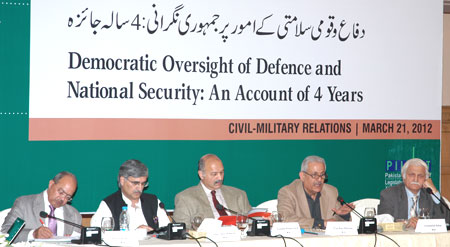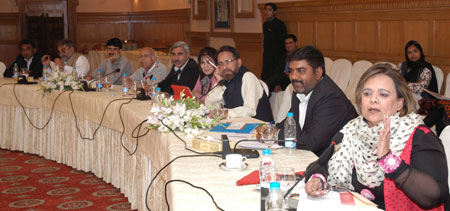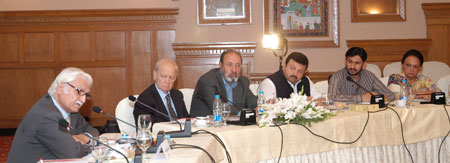|
|
| |
| EVENTS |
|
|
> Democratic and Parliamentary Oversight of Defence has begun, but a long way to go
|
|
|
| |
|
Public Forum
March 21, 2012
Islamabad
|
|
| |
March 21; Pakistan has made important strides on the road to establishing democratic and Parliamentary oversight on defence and national security but there remains a long and arduous struggle for establishing a constitutional equation of Civil-Military relations, believed experts and Members of Parliament, analysts and media representatives at the PILDAT Public Forum on Democratic Oversight of Defence and National Security: An Account of 4 Years. The initiative has to be taken by the Parliament with support from citizens and media. |
|
| |
Speakers at the Forum included Hafiz Tahir Khalil, Bureau Chief, Jang, Senator Mushahid Hussain Syed, Secretary General PML, Senator Farhatullah Babar, Spokesman President of Pakistan and Senator Mian Raza Rabbani, Chairman Parliamentary Committee on National Security.
|
|
| |
Hafiz Tahir Khalil said that while other committees of the Parliament are generally open for media coverage, regrettably Defence Committees mostly hold in-camera meetings. He demanded that this should change barring sensitive security issues. |
|
| |
Senator Mushahid Hussain Sayed said that Pakistan has, for the first time, given an institutional response to Pak-US relations. This has defined new rules of the game that the Parliament will discuss and approve. Looking ahead, he recommended that the concept of National Security must be re-defined from a security-specific definition to include important civilian components such as Constitution, Parliament, Political Parties, Judiciary, Education, Food, Energy, etc. He praised the work of the Parliamentary Committee on National Security (PCNS) and recommended that the Committee must be institutionalised. Working to define a comprehensive National Security strategy of Pakistan for every two years should be a major area of focus of the PCNS. Defence purchases and defence equipment should also be part of this strategy. |
|
| |
Senator Farhatullah Babar began by praising the efforts of PILDAT for not only consistently raising the taboo subject of fixing the imbalance in civil-military relations in Pakistan but also presenting its periodic assessments and studies and holding public forums on this taboo issue. Addressing the civil-military imbalance is a dangerous initiative, he said. He said that PILDAT must also study how power has gradually moved from Parliament to and civil Governments to military and military dictators. He said that the coalition Government has taken the initiative of presenting details of the defence budget since 2008 and it is now the responsibility of MPs who should come prepared to review this thoroughly and raise irrefutable points and suggestions. National Command Authority has been put under the Prime Minister which has opened the way for Parliamentary oversight. Another important development is the setting up of Parliamentary Committee on National Security (PCNS). One can disagree with the recommendations of the PCNS and it remains to be seen how much the Government adopts these, but the PCNS has consistently worked to strengthen the Parliament�s role. He presented the following recommendations for a Constitutional equation of civil-military relations:
- Developing consensus on correcting strategic imbalance in Civil-Military Relations in Pakistan; no Government can attempt to tackle this without the support of political parties, civil society and media
- Parliamentarians must utilise all Parliamentary instruments in addressing the issues of Civil-Military relations in Pakistan
- MPs and other sectors of society must demand that the Parliament should adopt the Johannesburg Principles on National Security, Freedom of Expression and Access
|
|
| |
Addressing the forum, Senator Raza Rabbani said that he does not share the optimism of other speakers that Pakistan is moving towards changing civil-military relations according to the Constitution. The changes that are apparent are cosmetic and due to regional and international scenario. The apparent �progress� is just to let off steam for the moment, he said. When we discuss civil-military imbalance, it is important to understand that this is essentially to change the mindset in which a civilian�s patriotism is always suspect and only a uniformed person can grant a certificate of patriotism. According to this mindset, civilians and politicians are not even competent to deal with issues of national security and foreign policy and can not be trusted with it. Disagreeing with Senator Farhatullah Babar in only one instance he said that the levers of power were not changed through ordinances from civil to the military but these changed when the concept of Pakistan was changed from a welfare state to a national security or a garrison state. All earlier Constitutional amendments were to consolidate powers for the military and military rulers. In a crude language, this is a turf war in which functions that have been in the domain of civil and military bureaucracy, now we are asking for Parliament�s oversight on those. He said that oversight will bring accountability and transparency in its wake that will go against ideological, institutional political and financial interests also.
Senator Rabbani said that fixing the civil-military imbalance is not an easy task and it requires a change in mindset. With just a change in the situation, we should not assume that we have changed the mindset. Important developments have taken place since March 2008. Military leadership has been called at the bar of the Parliament not just for briefing but for a gruelling question and answer session as well.
He said, however, that just because he is pessimistic, it does not mean he is without hope. The recommendations of the PCNS presented to the Parliament on March 20, 2012 mark a milestone in Pakistan�s Parliamentary history signifying that foreign policy, which has been considered a domain of civil and military bureaucracy, now has a collective Parliamentary ownership. These recommendations are open for debate and must be improved. Fixing civil-military imbalance in Pakistan is an issue of the survival of Pakistan and not of partisan interests. There is a long and arduous struggle for establishing a constitutional equation of Civil-Military relations, a change that will yield most painfully, said Senator Rabbani. |
|
| |
In his opening remarks, Mr. Ahmed Bilal Mehboob said that PILDAT has set a tradition of reviewing the performance of various government and Parliamentary forums on democratic and Parliamentary oversight of defence and National Security. PILDAT believes that civilian supremacy in interpreting national interests will only be possible only through effective forums for developing national security policies. Parliament�s oversight and accountability of the security sector will serve to strengthen Pakistan�s national security and public trust in security institutions. National Security should not be used as a pretext for avoiding accountability.
He launched 4 Citizens Monitoring Reports from the platform of PILDAT:
- Performance of the Defence Committee of the Cabinet, [ Download Urdu Version ]
- Performance of the Parliamentary Committee on National Security
- Performance of the Senate Standing Committee on Defence & Defence Production
- Performance of the National Assembly Standing Committee on Defence
|
|
| |
Evaluating the performance, Mr. Mehboob said that the Defence Committee of the Cabinet (DCC) signifies the supremacy of elected civilian leaders in interpreting national interests and in laying down the broad parameters of defence and foreign policy. However, despite serious internal and external security challenges facing Pakistan from March 2008-March 2012, the DCC has met on an average a little more than twice in a year. The DCC held one meeting in year 2008-2009, two meetings in 2009-201010, one meeting in 2010-2011 and five meetings in 2011-2012. PILDAT recommends that DCC should meet at fixed regular intervals (UK NSC meets weekly); a permanent Secretariat and a dedicated think tank are essential for effective functioning. The scope of the DCC should be enlarged to such strategic areas as Food Security and Energy Security, etc. A full-time National Security Advisor should be appointed to coordinate National Security related functions in PM Secretariat. He also recommended that a multi-tier approach may be useful to include private sector in the consultative process while the DCC must include a coordination and oversight mechanism for the intelligence agencies. |
|
| |
The National Assembly Standing Committee on Defence held 36 meetings in 4 Years; an average of 9 meetings per year. It presented 6 reports with no report in Year 4. It has performed slightly better than the Senate Defence Committee that held 26 meetings in 3 years. Mr. Mehboob said that from the publicly available details of performance, it is unclear how effectively it has helped the executive on defence and security policies of the country. The Senate Committee on Defence and Defence Production has held 26 meetings in 3 years and it has presented no reports in 3 years due to �security concerns.� Both committees should consider setting up sub-committees on intelligence.
The Parliamentary Committee on National Security held 63 meetings in 4 years and remains by far the most active Parliamentary Committee. It made recommendations on 4 issues, the latest being on Foreign Policy submitted for Parliamentary approval on March 20, 2012. Mr. Mehboob lauded PCNS for comprehensive recommendations, adding that Parliamentary review now is a welcome step. PCNS has been unable to provide its recommendations for a comprehensive National Security Policy. PILDAT recommends that the committee needs to review the provision of blanket �in-camera� rule under which it holds all its meetings and it must open itself to hold public hearings. The PCNS should also conduct a periodic review of Pakistan�s foreign policy and its national security preferences.
Overall the pace of exercising democratic oversight of defence and security remains slow and largely ineffective, said Mr. Mehboob. The government and Parliamentary forum�s reaction to issues has been slow. Parliamentary forums, especially the Defence Committees, have largely not fulfilled the basic requirement of reporting recommendations to the House. He lauded the PCNS for not joining the briefings given to Defence committees at the GHQ adding that it is the security agencies that must come to the Parliament for such hearings and briefings.
A number of MPs, analysts, civil society representatives and media persons joined the Public Forum. |
|
| |
|
|
| |

|
|
| |
|
|
| |

|
|
| |
|
|
| |

|
|
| |
|
|
| |

|
|
|
|
|
|
|
|
|